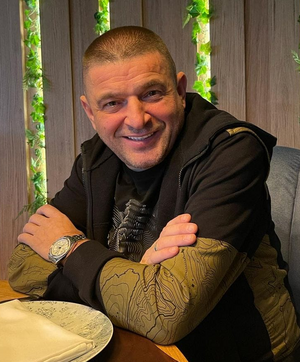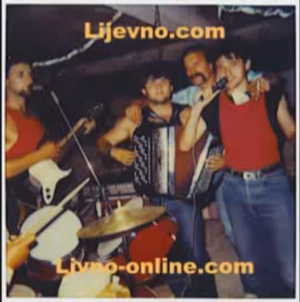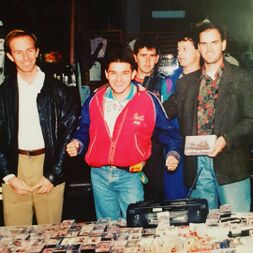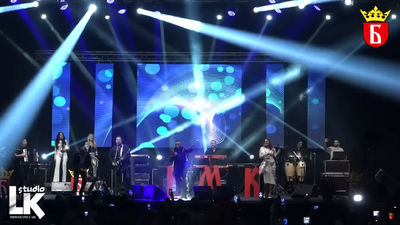Baja Mali Knindža: Difference between revisions
(headings) |
(reformatting. Lots of new info) |
||
| Line 34: | Line 34: | ||
==== Još se ništa ne zna and career at SuperTon (1993-1995) ==== | ==== Još se ništa ne zna and career at SuperTon (1993-1995) ==== | ||
In September 1993, Baja would appear in interviews and [[Baja Mali Knindža concerts|start touring]] for his upcoming album, [[Još se ništa ne zna|''Još se ništa ne zna'']]. Upon release, ''Još se ništa ne zna'' became one of Baja's most popular albums and would be the start of his work with [[SuperTon]]. Shortly after the release of the album, Baja's first VHS, which featured music videos to his more popular songs, [[Najveći hitovi (Baja Mali Knindža VHS)|''Najveći hitovi'']] would be released. At the end of the year, he would release two albums, [[Rat i mir|''Rat i mir'']] and [[Kockar bez sreće|''Kockar bez sreće'']] with the former containing patriotic songs and the latter containing love songs that were inspired by older, non-war material similar to his work in the mid 80's. [[File:1993 Superton Catalog Sabor.jpeg|thumb|A [[SuperTon]] ad in the December 1993 release of [[Sabor]] advertising [[Rat i mir]] and [[Kockar bez sreće]] and wishing readers a happy new year.]]Baja released one album in 1994, [[Pobediće istina|''Pobediće istina'']]. It would receive a CD release on behalf of Estrada shop along with other songs from older titles and was aptly named ''[[Najveći hitovi - Pobediće istina]]''. The second Baja VHS, [[Rat i Mir (VHS)|''Rat i mir'']], released. It would feature music videos for select tracks of the [[Rat i mir|album of the same name]] as well as ''[[Kockar bez sreće]]''. The poems featured in the VHS were to be compiled in his one and only book, ''Nedefinisan čovek'', however, it never came to fruition. | |||
In early 1995, he would release three more albums: [[Igraju se delije|''Igraju se delije'']], [[Idemo dalje|''Idemo dalje'']], and ''[[Zbogom oružje]]''. ''Igraju se delije'' would be the last time Goran would accompany Baja on his own albums and would also be the first collaboration with Željko Jovanović. ''Idemo dalje'' was released in August of that year, shortly before Krajina fell. Shortly after the war officially ended, [[Zbogom oružje]] released in late 1995, critical of the war and the political climate at the time. | |||
==== Post-war (1996-1998) ==== | |||
After working on side projects, Baja would depart SuperTon some time in 1997. He went to Lazarević Produktion and released [[Ne dirajte njega|''Ne dirajte njega'']] in 1997. During the Serbian general elections in the same year, Baja was asked by controversial politician Vojislav Šešelj to produce a cassette with songs dedicated to the Serbian Radical Party. With three songs dedicated to the party and the rest being reused material from other albums, [[Srpskim radikalima|''Srpskim radikalima'']] was released.<ref>[https://www.youtube.com/watch?v=3_Sd8TdWTMw "Baja Mali Knindza o Šešelju"] ''Youtube.com''</ref> In 1998, SuperTon would release ''[[The Best Off]]'', however, it is not known if Baja was directly involved with the album's production or not. | |||
==== Career at Renome and subsequent hiatus (1999-2001) ==== | |||
In 1999, Baja went to Renome and released his last war-related album, [[Biti 'il ne biti|''Biti 'il ne biti'']]. Its contents [[Music during the Kosovo War|focused on the then ongoing Kosovo War and the NATO bombing of Yugoslavia]]. Accompanied by [[Dragan Stojković Bosanac]], he also would release [[Gara iz Lončara / Život je tamo]] with the songs "[[Evo džepa, đe su pare bile]]" and "[[Duni vjetre malo preko jetre]]" being one of his most popular songs. Like ''[[Kockar bez sreće]]'', the album would feature no patriotic songs. | |||
In 2000, he released [[Povratak u budućnost|''Povratak u budućnost'']], which featured another popular track, "[[Samo je moj stari znao]]". Despite his name appearing on the cover of Slaja bend's [[Nova mega gara|''Nova mega gara'']], he would only appear on certain tracks and would be credited as a guest. He would return to Nina Trejd one last time and release [[Zaljubljen i mlad]] which featured reimagined versions of songs from ''Kockar bez sreć''e as well as some new material. Around this time, Renome's sublabel, [[patriot]], would release the compilation ''[[Moje najljepše, one naše ?! Vaš Baja Mali]]''. It is unknown, however, if Baja had any involvement surrounding its release. | |||
In | In 2001, he released [[Đe si legendo]] which had a change in musical direction. Rather than be solely folk, it would mix elements of rock and roll and pop. It would also feature a rock version of the ''Igraju se delije'' song "[[Kuća časti]]". Renome would release the compilation, ''Hitovi'', although the songs in the compilation would only feature songs published by the label. | ||
In 2002, he released [[Zbogom pameti|''Zbogom pameti'']]. The album contains reimagined versions of the ''Kockar bez sreće'' songs, "[[Ko je ljubio, taj ne ljubi više]]" and "[[Prošli su mi vozovi]]" as well as a reimagining of Braća sa Dinare song, "[[Loš učenik]]" albeit renamed to "Šta je tebi, dođi sebi". It includes the duet, "[[Šta ti bi]]", which was released a year prior on Nada Obrić's ''Tako je život hteo''. Following the release of the album, Baja would stick to live performances and be more involved with the industry for the next four years. Around this time, Baja would start singing vular songs in his live performances, typically about women and drinking.[[File:Modern Baja Mali Knindza concert.png|thumb|400x400px|2022 Baja Mali Knindža concert]] | |||
==== Za kim zvona zvone and BN Music ==== | |||
In 2006, Baja released [[Za kim zvona zvone|''Za kim zvona zvone'']]. From ''Za kim zvona zvone'' onward, Baja's albums would incorporate elements of folk and pop. Renome would release [[Baja Mali Knindža i prijatelji]] which featured Baja and other folk artists who performed at [[Svijet Renomea]] the previous year. | |||
In 2007, he released [[Gluvi barut|''Gluvi barut'']] which had more emphasis on pop (which was common for the industry time of the release) and would be the last album published by Renome. Another compilation, ''[[Best of Baja Mali Knindža]]'' was also released. After 2008, Baja would leave Renome and go to BN Music. | |||
In 2010, he would release his first BN Music album [[Idemo malena|''Idemo malena'']] and would feature autotuned vocals. After the death of his cousin, Kseniji Pajčin, Baja wrote a song titled "Spavaj, kraljice" in her memory.<ref>"[https://web.archive.org/web/20150122222402/http://www.kurir.rs/baja-mali-knindza-placem-za-sestrom-ksenijom-clanak-65212 Plačem za sestrom Ksenijom]". Kurir. 27 December 2010. Archived from [http://www.svet.rs/najnovije-vesti/baja-mali-knindza-posvetio-pesmu-kseniji-pajcin...  Originalno objavljeno na stranici www.svet.rs/najnovije-vesti/baja-mali-knindza-posvetio-pesmu-kseniji-pajcin the original] on 22 January 2015. Retrieved 26 July 2023.</ref> The song would never receive an official release as Baja never intended to ever record it citing turmoil and grief. Despite this, the song was recorded and subsequently uploaded to the internet where it would go viral.<ref>"[https://archive.ph/4fwzd NAJTUŽNIJA PESMA BAJE MALOG KNINDŽE POSVEĆENA JE KSENIJI PAJČIN Nikad je nisam snimio, ne pevam je! To je nešto moje što me boli... (VIDEO)]." Alo!. 16 March 2021. Archived from [https://www.alo.rs/vip/vip/baja-mali-knindza-ksenija-pajcin-pesma/395834/vest the original]. Retrieved 26 July 2023.</ref> Around this time, Baja would stop singing overly nationalistic songs at live performances. He would also begin be accompanied by the rock band, [[Minđušari]], in live performances, contrary to a typical set-list that featured a local band. He still tours with them occasionally with the most recent appearance being in 2022.<ref>"[https://www.youtube.com/watch?v=D3-ZZeXZ9Ps Baja Mali Knindza - VELIKA SALA SPENS - 18.11.2022. (PROMO)]". 9 November 2022. Retrieved 26 July 2023. | |||
In | |||
</ref> | |||
In 2012, he would release, [[Lesi se vraća kući|''Lesi se vraća kući'']]. While it would be his last album for the company, he worked within the company until 2015 where would release a single, ''[[Tetreb]]''. | |||
==== Official Youtube channel and self-published work (2014- present) ==== | |||
In 2014, Baja would work on an album for Narodni pokret Dinara Drina Dunav titled, [[Govor duše]]. It includes patriotic songs in the same vein as his work from the 90's and includes an updated version of the ''Još se ništa ne zna'' song, "[[Nisu suze za Srbina]]". Despite wishes to make another album, it is the last album Baja has released to date. | |||
On June 14, 2018, the official YouTube channel for Baja Mali Knindža would be created.<ref>"[https://www.youtube.com/@BMKOfficialChannel/about BMK Official Channel About]". 17 June 2018. Retrieved 26 July 2023.</ref> It would become the main place for Baja<nowiki>'s current work to be released. Currently he only publishes singles and some live performances. His most recent single would be Najčistija beretka ''CIGO''</nowiki>, released April 20, 2021. While Baja will still perform patriotic music and love songs live, their contents are not nearly as chauvinistic. | |||
Baja has had a recent increase in popularity and still is one of the most popular singers in Serbia. In recent years, he has developed a cult following in non-Serb circles online due to the increasing awareness of his work during the war. | |||
==== Live releases ==== | |||
During the early 2000's albums of Baja's live performances would be produced. The legitimacy of these labels are unknown and it is not known if Baja had any involvement with producing these albums. In 2002, [[Carisma Disc International]] released [[!!! Luda žurka !!!|''!!! Luda žurka !!!'']]. In 2003, a cassette titled[[Uživo (Baja Mali Knindža 2003)|''Uživo'']] released on cassette. A year later, another concert recording on CD also called [[Uživo (Baja Mali Knindža 2004)|''Uživo'']] was released. In the same year, [[Još sad pa ko zna kad !|''Još sad pa ko zna kad!'']] was released both as a two part Cassette release and a two CD version. The live performance used for volume one is also used in ''Ajmo braćo u kafanu''. In 2006, [[Cronic München]] released [[Ajmo braćo u kafanu|''Ajmo braćo u kafanu'']], [[Gara iz Nemačke|''Gara iz Nemačke'']] and [[Hoćemo li brate zapjevati|''Hoćemo li brate zapjevati'']]. Information regarding the performances themselves are currently unknown. | |||
==== | == Side Projects == | ||
==== Baja bend ==== | |||
In 1994, Baja partnered with arranger Goran Radinović as Goki i Baja bend. The pair would go onto produce three albums: ''[[Braća sa Dinare (Album)|Braća sa Dinare]]'', ''Život damo Krajine ne damo'', and ''Samotnjak''. After Radinović's departure from SuperTon in 1995, it would be rebranded to Baja bend. Baja bend would produce two more albums: Seobe in 1995 and Svrati posle snegova in 1996. Since then, Baja bend has been inactive. | |||
==== Braća sa Dinare ==== | |||
In 1994, Baja would form a group with his younger brother, Novak Pajčin as well as a friend, Luka Mihaljica. The group would be called Braća sa Dinare (<small>lit.</small> "Brothers from Dinara") and their [[Braća sa Dinare (Album)|debut album of the same]] name would release the same year. Baja would be heavily involved in the second album, ''[[Bila jednom jedna zemlja]]'' as all but one track only has Baja performing. Some time after the war, Baja would give a helping hand to his cousin Lazo after expressing concerns of his career after the war.<ref>"[https://archive.ph/Jc1Cw LAZO PAJČIN PRAVIO JE HITOVE SAMO OD NASLOVA: Baja Mali Knindža setio se pokojnog brata i ispričao detalje koje niko ne zna]". Kurir. 22 June 2022. Archived from [https://www.kurir.rs/stars/3957323/lazo-pajcin-pravio-je-hitove-samo-od-naslova-baja-mali-knindza-setio-se-pokojnog-brata-i-ispricao-detalje-koje-niko-ne-zna the original]. Retrieved 26 July 2023.</ref> Recording would take place at SuperTon during April and May of 1996 and resulted in ''Plači voljena zemljo''. In 1997, the band's label would move to Nina Trejd where the last two albums, ''[[Ja se svoga, ne odričem do groba]]'' and ''[[Idemo do kraja]]'' (released 1997 and 1998, respectively) would be published. While Baja himself would cover songs he wrote for the group,<ref>"[https://www.youtube.com/watch?v=NlZrBSCUsvU Baja Mali Knindza - Cedo maleni - (LIVE) - (Banja Luka 2020)]". 26 September 2020. Retrieved 26 July 2023.</ref> the group itself never performed live. | |||
== Other activity == | |||
[TBA] | |||
== Musical style == | |||
[TBA] | |||
== Discography == | == Discography == | ||
| Line 133: | Line 144: | ||
==== Compilations ==== | ==== Compilations ==== | ||
{{Div col|colwidth=30em|content=*''[[Najveći hitovi | {{Div col|colwidth=30em|content=*''[[Najveći hitovi - Pobediće istina|Najveći hitovi]] (1994) | ||
*''[[The | *''[[The Best Off]] (1998) | ||
*''[[Krajiški vitez]] (2000) | *''[[Krajiški vitez]] (2000) | ||
*''[[Hitovi (Baja Mali Knindža | *''[[Hitovi (2001 Baja Mali Knindža Compilation)|Hitovi]] (2001) | ||
*''[[Moje najljepše, one naše ?! Vaš Baja Mali]] | *''[[Moje najljepše, one naše ?! Vaš Baja Mali]] | ||
*''[[Best of | *''[[Best of Baja Mali Knindža]] (2007)}} | ||
==== Video ==== | ==== Video ==== | ||
| Line 150: | Line 161: | ||
*''[[Život damo Krajine ne damo (Album)|Samotnjak]] (1994) | *''[[Život damo Krajine ne damo (Album)|Samotnjak]] (1994) | ||
*''[[Seobe (Album)|Seobe]] (1995) | *''[[Seobe (Album)|Seobe]] (1995) | ||
*''[[Svrati posle snegova (Album)|Svrati posle snegova]] (1996 | *''[[Svrati posle snegova (Album)|Svrati posle snegova]] (1996)}} | ||
==== With Braća sa Dinare ==== | ==== With [[Braća sa Dinare]] ==== | ||
{{Div col|colwidth=30em|content=*''[[Braća sa Dinare (Album)|Braća sa Dinare]] (1994) | {{Div col|colwidth=30em|content=*''[[Braća sa Dinare (Album)|Braća sa Dinare]] (1994) | ||
*''[[Bila jednom jedna zemlja]] (1995) | *''[[Bila jednom jedna zemlja]] (1995) | ||
Revision as of 06:15, 27 July 2023
Mirko Pajčin (Serbian Cyrillic: Мирко Пајчин; born 13 October 1966), better known by his stage name Baja Mali Knindža (Serbian Cyrillic: Баја Мали Книнџа), is a Bosnian Serb folk singer and poet. He is most known for his wartime music and remains to be one of the most popular artists in Serbia.
Early life
Baja was born on 13 October 1966 in the village of Gubin, SFR Yugoslavia (present-day Bosnia and Herzegovina).[1] While attending school, Baja claims that his Serbian language teacher, Milan Poparić, influenced him heavily and introduced him to poetry. He started writing songs, reciting poems, acting, and singing at a young age. He attended high school in Bačka Palanka and ended up moving to Belgrade two years later. After graduating from high school, he initially worked at the IMT tractor factory in Belgrade, then briefly worked at the then "Tito" shipyard before finishing his mandatory military service in Livno. At the end of his military service, he started working at the Belgrade airport.
Baja became interested in singing when his friend from Surčin held a celebration, to which Baja was invited; He was offered a microphone to sing as part of the event. His performance would earn him a tip that was five times greater than his airport salary, to which he said to himself, "Baja, you won't wake up early anymore".
Career
Baja would soon perform in cities like Sarajevo at the restaurant "Holidej" in Čengić vila, which was owned by a cousin of Lepi Mića, sharing the stage with artists like Ljubiša Vasiljević.
In 1989, he contributed to writing the Tromeđa album Izvorne pjesme Dalmacije, Like i Krajine, which included one of their biggest hits, "Nema raja bez rodnoga kraja". Later in the year, Baja wanted to participate in the music competition "Prvi glas Livna", but was denied when the judges found out that Baja was a professional musician and the song, "Nema raja bez rodnoga kraja" was already on an album. He was permitted to perform the song along with another song "Nemoj me lagati mila", but could not compete.[2][3]
Ne dam Krajine and mainstream success (1992-1993)
When the breakup of Yugoslavia began, Baja's songs turned patriotic, and he set out to make an album about the conflict. He managed to gather just enough money to record his own first album, but somehow lost it all on the way to the studio. Now in debt and in search of a record label to take him, he eventually found Jugodisk after being rejected by PGP RTS.
In 1992, he released his debut album Ne dam Krajine. Upon release, it would become very successful, catapulting Baja into the mainstream. In mid-1992, he would go to Nina Trade and release Stan'te paše i ustaše. The album would go onto sell 300,000 copies and received a Platinum award at Hala Borik Banja Luka in 1997. Despite his mainstream success, Baja had a strained relationship with the media. His 1992 Poselo performance of "Pevaj Srbijo" was cut from TV broadcasting and only ever had a few select appearances on radio and TV.[4]
In February 1993, Baja would release his best-selling album, Živeće ovaj narod,[5] and a live album, Sve za Srpstvo, Srpstvo nizašta. During his time at Nina Trejd, Baja would help Gordan Krajišnik with his debut album, Koridor Slobode as well as contribute to Boro Srbin's self-titled debut album.
Još se ništa ne zna and career at SuperTon (1993-1995)
In September 1993, Baja would appear in interviews and start touring for his upcoming album, Još se ništa ne zna. Upon release, Još se ništa ne zna became one of Baja's most popular albums and would be the start of his work with SuperTon. Shortly after the release of the album, Baja's first VHS, which featured music videos to his more popular songs, Najveći hitovi would be released. At the end of the year, he would release two albums, Rat i mir and Kockar bez sreće with the former containing patriotic songs and the latter containing love songs that were inspired by older, non-war material similar to his work in the mid 80's.
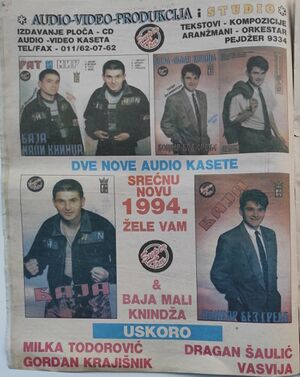
Baja released one album in 1994, Pobediće istina. It would receive a CD release on behalf of Estrada shop along with other songs from older titles and was aptly named Najveći hitovi - Pobediće istina. The second Baja VHS, Rat i mir, released. It would feature music videos for select tracks of the album of the same name as well as Kockar bez sreće. The poems featured in the VHS were to be compiled in his one and only book, Nedefinisan čovek, however, it never came to fruition.
In early 1995, he would release three more albums: Igraju se delije, Idemo dalje, and Zbogom oružje. Igraju se delije would be the last time Goran would accompany Baja on his own albums and would also be the first collaboration with Željko Jovanović. Idemo dalje was released in August of that year, shortly before Krajina fell. Shortly after the war officially ended, Zbogom oružje released in late 1995, critical of the war and the political climate at the time.
Post-war (1996-1998)
After working on side projects, Baja would depart SuperTon some time in 1997. He went to Lazarević Produktion and released Ne dirajte njega in 1997. During the Serbian general elections in the same year, Baja was asked by controversial politician Vojislav Šešelj to produce a cassette with songs dedicated to the Serbian Radical Party. With three songs dedicated to the party and the rest being reused material from other albums, Srpskim radikalima was released.[6] In 1998, SuperTon would release The Best Off, however, it is not known if Baja was directly involved with the album's production or not.
Career at Renome and subsequent hiatus (1999-2001)
In 1999, Baja went to Renome and released his last war-related album, Biti 'il ne biti. Its contents focused on the then ongoing Kosovo War and the NATO bombing of Yugoslavia. Accompanied by Dragan Stojković Bosanac, he also would release Gara iz Lončara / Život je tamo with the songs "Evo džepa, đe su pare bile" and "Duni vjetre malo preko jetre" being one of his most popular songs. Like Kockar bez sreće, the album would feature no patriotic songs.
In 2000, he released Povratak u budućnost, which featured another popular track, "Samo je moj stari znao". Despite his name appearing on the cover of Slaja bend's Nova mega gara, he would only appear on certain tracks and would be credited as a guest. He would return to Nina Trejd one last time and release Zaljubljen i mlad which featured reimagined versions of songs from Kockar bez sreće as well as some new material. Around this time, Renome's sublabel, patriot, would release the compilation Moje najljepše, one naše ?! Vaš Baja Mali. It is unknown, however, if Baja had any involvement surrounding its release.
In 2001, he released Đe si legendo which had a change in musical direction. Rather than be solely folk, it would mix elements of rock and roll and pop. It would also feature a rock version of the Igraju se delije song "Kuća časti". Renome would release the compilation, Hitovi, although the songs in the compilation would only feature songs published by the label.
In 2002, he released Zbogom pameti. The album contains reimagined versions of the Kockar bez sreće songs, "Ko je ljubio, taj ne ljubi više" and "Prošli su mi vozovi" as well as a reimagining of Braća sa Dinare song, "Loš učenik" albeit renamed to "Šta je tebi, dođi sebi". It includes the duet, "Šta ti bi", which was released a year prior on Nada Obrić's Tako je život hteo. Following the release of the album, Baja would stick to live performances and be more involved with the industry for the next four years. Around this time, Baja would start singing vular songs in his live performances, typically about women and drinking.
Za kim zvona zvone and BN Music
In 2006, Baja released Za kim zvona zvone. From Za kim zvona zvone onward, Baja's albums would incorporate elements of folk and pop. Renome would release Baja Mali Knindža i prijatelji which featured Baja and other folk artists who performed at Svijet Renomea the previous year.
In 2007, he released Gluvi barut which had more emphasis on pop (which was common for the industry time of the release) and would be the last album published by Renome. Another compilation, Best of Baja Mali Knindža was also released. After 2008, Baja would leave Renome and go to BN Music.
In 2010, he would release his first BN Music album Idemo malena and would feature autotuned vocals. After the death of his cousin, Kseniji Pajčin, Baja wrote a song titled "Spavaj, kraljice" in her memory.[7] The song would never receive an official release as Baja never intended to ever record it citing turmoil and grief. Despite this, the song was recorded and subsequently uploaded to the internet where it would go viral.[8] Around this time, Baja would stop singing overly nationalistic songs at live performances. He would also begin be accompanied by the rock band, Minđušari, in live performances, contrary to a typical set-list that featured a local band. He still tours with them occasionally with the most recent appearance being in 2022.[9]
In 2012, he would release, Lesi se vraća kući. While it would be his last album for the company, he worked within the company until 2015 where would release a single, Tetreb.
Official Youtube channel and self-published work (2014- present)
In 2014, Baja would work on an album for Narodni pokret Dinara Drina Dunav titled, Govor duše. It includes patriotic songs in the same vein as his work from the 90's and includes an updated version of the Još se ništa ne zna song, "Nisu suze za Srbina". Despite wishes to make another album, it is the last album Baja has released to date.
On June 14, 2018, the official YouTube channel for Baja Mali Knindža would be created.[10] It would become the main place for Baja's current work to be released. Currently he only publishes singles and some live performances. His most recent single would be Najčistija beretka ''CIGO'', released April 20, 2021. While Baja will still perform patriotic music and love songs live, their contents are not nearly as chauvinistic.
Baja has had a recent increase in popularity and still is one of the most popular singers in Serbia. In recent years, he has developed a cult following in non-Serb circles online due to the increasing awareness of his work during the war.
Live releases
During the early 2000's albums of Baja's live performances would be produced. The legitimacy of these labels are unknown and it is not known if Baja had any involvement with producing these albums. In 2002, Carisma Disc International released !!! Luda žurka !!!. In 2003, a cassette titledUživo released on cassette. A year later, another concert recording on CD also called Uživo was released. In the same year, Još sad pa ko zna kad! was released both as a two part Cassette release and a two CD version. The live performance used for volume one is also used in Ajmo braćo u kafanu. In 2006, Cronic München released Ajmo braćo u kafanu, Gara iz Nemačke and Hoćemo li brate zapjevati. Information regarding the performances themselves are currently unknown.
Side Projects
Baja bend
In 1994, Baja partnered with arranger Goran Radinović as Goki i Baja bend. The pair would go onto produce three albums: Braća sa Dinare, Život damo Krajine ne damo, and Samotnjak. After Radinović's departure from SuperTon in 1995, it would be rebranded to Baja bend. Baja bend would produce two more albums: Seobe in 1995 and Svrati posle snegova in 1996. Since then, Baja bend has been inactive.
Braća sa Dinare
In 1994, Baja would form a group with his younger brother, Novak Pajčin as well as a friend, Luka Mihaljica. The group would be called Braća sa Dinare (lit. "Brothers from Dinara") and their debut album of the same name would release the same year. Baja would be heavily involved in the second album, Bila jednom jedna zemlja as all but one track only has Baja performing. Some time after the war, Baja would give a helping hand to his cousin Lazo after expressing concerns of his career after the war.[11] Recording would take place at SuperTon during April and May of 1996 and resulted in Plači voljena zemljo. In 1997, the band's label would move to Nina Trejd where the last two albums, Ja se svoga, ne odričem do groba and Idemo do kraja (released 1997 and 1998, respectively) would be published. While Baja himself would cover songs he wrote for the group,[12] the group itself never performed live.
Other activity
[TBA]
Musical style
[TBA]
Discography
Albums
- Ne dam Krajine (1992)
- Stan'te paše i ustaše (1992)
- Živeće ovaj narod (1993)
- Još se ništa ne zna (1993)
- Rat i mir (1993)
- Kockar bez sreće (1993)
- Pobediće istina (1994)
- Igraju se delije (1995)
- Idemo dalje (1995)
- Zbogom oružje (1995)
- Ne dirajte njega (1997)
- Srpskim radikalima (1997)
- Biti 'il ne biti (1999)
- Gara iz Lončara / Život je tamo (1999)
- Povratak u budućnost (2000)
- Zaljubljen i mlad (2000)
- Đe si legendo (2001)
- Zbogom pameti (2002)
- Za kim zvona zvone (2006)
- Gluvi barut (2007)
- Idemo malena (2010)
- Lesi se vraća kući (2012)
- Govor duše (2014)
Singles
- Tankosić As (2015)
- Duško Kornjača (2015)
- Ima srce lavlje (2015)
- Tetreb (2015)
- Himna FK Karanovac (2016)
- Boro brate (2016)
- Jovin goli otok (2016)
- Ulje maslinovo (2019)
- Nisu dostojni tebe (2019)
- Dinarsko srce (2019)
- Srpska Atina (2020)
- Brat (2020)
- Volim svoju zemlju (2020)
- Luče sa Dorčola (2020)
- Najčistija beretka "CIGO" (2021)
- Šarena laža (2021)
- 4. Avgust (2021)
Live
- Sve za Srpstvo, Srpstvo nizašta (1993)
- !!! Luda žurka !!! (2002)
- Uživo (2003)
- Uživo (2004)
- Uživo 3
- Još sad pa ko zna kad ! (2004)
- Ajmo braćo u kafanu (2006)
- Gara iz Nemačke (2006)
- Hoćemo li brate zapjevati (2006)
- Ima Srba, ima još (2009)
- Kralj mijenja kralja, car mijenja cara (2009)
Compilations
- Najveći hitovi (1994)
- The Best Off (1998)
- Krajiški vitez (2000)
- Hitovi (2001)
- Moje najljepše, one naše ?! Vaš Baja Mali
- Best of Baja Mali Knindža (2007)
Video
- Najveći hitovi (1993)
- Rat i mir (1994)
- Baja Mali Knindža i prijatelji (2006)
- Uživo
With Baja bend
- Život damo Krajine ne damo (1994)
- Samotnjak (1994)
- Seobe (1995)
- Svrati posle snegova (1996)
With Braća sa Dinare
- Braća sa Dinare (1994)
- Bila jednom jedna zemlja (1995)
- Plači voljena zemljo (1996)
- Ja se svoga, ne odričem do groba (1997)
- Idemo do kraja (1998)
References
- ↑ "Lična karta". Knindza.info. Archived link.
- ↑ Baja Mali Knindža Biography. Biografija.org. Archived link.
- ↑ "Ispovijest Mirka Pajčina". Medium.com. Archived link.
- ↑ 13.01.2021 Interview. Informer.rs. Archived link.
- ↑ "Karijera". Baja-mali-knindza.com. Archived link.
- ↑ "Baja Mali Knindza o Šešelju" Youtube.com
- ↑ "Plačem za sestrom Ksenijom". Kurir. 27 December 2010. Archived from the original on 22 January 2015. Retrieved 26 July 2023.
- ↑ "NAJTUŽNIJA PESMA BAJE MALOG KNINDŽE POSVEĆENA JE KSENIJI PAJČIN Nikad je nisam snimio, ne pevam je! To je nešto moje što me boli... (VIDEO)." Alo!. 16 March 2021. Archived from the original. Retrieved 26 July 2023.
- ↑ "Baja Mali Knindza - VELIKA SALA SPENS - 18.11.2022. (PROMO)". 9 November 2022. Retrieved 26 July 2023.
- ↑ "BMK Official Channel About". 17 June 2018. Retrieved 26 July 2023.
- ↑ "LAZO PAJČIN PRAVIO JE HITOVE SAMO OD NASLOVA: Baja Mali Knindža setio se pokojnog brata i ispričao detalje koje niko ne zna". Kurir. 22 June 2022. Archived from the original. Retrieved 26 July 2023.
- ↑ "Baja Mali Knindza - Cedo maleni - (LIVE) - (Banja Luka 2020)". 26 September 2020. Retrieved 26 July 2023.
